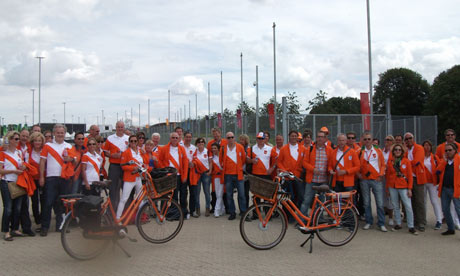Going Dutch at the Olympics
Orange-clad cyclists are so determined to cycle between Games venues that they've brought a truckload of bikes with them

Dutch cyclists at the Eton Manor transport hub, north of the Olympic Park. Photograph: Matthew Wright
There are 80 of them in total. Even the 52 I met lifted my mood, as I stood by the thinly stacked Eton Manor Olympic cycle park. Their co-ordinated orange tops and orange bikes are a magnificent statement ofcycling confidence. Could it be that the example we need to get biking around the Olympics – midway through our year of going Dutch – comes from the Dutch themselves?
Though the bike blog has reported on the limpness of the Olympic Delivery Authority's (ODA) cycling provision several times, it is still disappointing to have to say that so far, visitors cycling to the Olympic Park and nearby venues have been little more than a tenth of the 4,400 cycling visitors per day the ODA was originally aiming for.
The orange-clad cyclists are guests of Dutch firm Pon, and they are so determined to cycle between venues that they have brought a truckload of Dutch bikes with them. British opinion would tend to dismiss such enthusiastic cyclists as a convention of lettuce-eaters, and get back to complaining about the traffic. But Pon is not a niche environmental outfit. It is an international business services company and an official supplier of the Dutch Olympic team, with extensive links to the automotive industry. The visitors are senior executives and their clients, and their visit a lesson in how totally mainstream cycling is for the Dutch.
For Hans van der Valk, Pon's senior vice president for passenger cars, bringing bikes was simply a pragmatic choice. "We studied the logistics of moving around London in a large group, and decided that cycling was the best way," he says. Pon has provided a few cars as well, but only those who are not physically able to ride have chosen the lift. "We are very happy to choose bikes. Most people like biking," he says.
Despite its involvement in the automotive sector, Pon also invests incycling. It acquired Dutch bike company Gazelle last year. Van der Valk sees the future of the business in increased use of bikes alongside more efficient use of cars. "Cycling is a growth area," he says. It is also something enjoyed by every level of society in the Netherlands. Van der Valk assures me that it is completely normal for a senior Dutch executive to cycle around town, though it is difficult to imagine British board-level executives – let alone automotive chiefs – doing the same.
Van der Valk is diplomatic about his clients' impression of Londoncycling. "We have had a very positive experience," he says. "People have been very friendly, and the traffic is not too bad."
Unsurprisingly, the condition of the infrastructure disappoints. "The cycle paths are very narrow, and we have to remember to ride on the left," he says. In the Netherlands there are usually separate tracks for each direction of travel, which means cyclists can ride abreast and chat.
Alec Lemaire of the London Bicycle Tour Company, who is project managing the visit, sees the Dutch group's experiences in sharper relief. The respect accorded to cyclists in the Netherlands is not necessarily useful preparation for London traffic. "Dutch cyclists have a sense of entitlement on the road," he says, "which can lead to problems ..."
Lemaire is optimistic that the quality of cycling experience for Olympic visitors can be good, though he has had to choose the routes between venues carefully, using his local knowledge. "It is extremely challenging to get to the Olympic Park venues by bike. Cyclists visiting the Olympics should avoid the most direct route, and try to use quiet back roads," he says. It's not great for independent cyclists new to the area.
Bike parking at the transport hubs is secure, with a bike mechanic providing free check-ups and a Met officer offering security marking. And Olympic staff are friendly. "They are keen to have us," says Lemaire. That may be because cycle parking assistants are getting lonely. At Eton Manor, the 52 Dutch bikes were perhaps a fifth of the total parked. At Victoria Park, the second of the three Olympic Park cycle parks, the Dutch bikes were virtually the only ones there. There's no avoiding the scale of the missed opportunity.
The Dutch show us how easy and relaxed cycling should be, even without the extensive network of traffic-free routes many cyclists were hoping for. The ODA could have attracted more cyclists with some volunteer cycling guides and a bike hire service for visitors. It has provided limousine drivers and public transport stewards by the thousand. But the small-scale, bolt-on bike provision just reminds us again that despite progress on many fronts, cycling is not yet considered a serious, mainstream form of transport. Friday's heavy-handed Critical Mass arrests only confirm the perceived marginalisation.
In Sunday's women's road race, Marianne Vos of the Netherlands pipped Britain's Lizzie Armitstead to the finishing post. If only we were that close behind the Dutch when it comes to putting the bike at the centre of civilised urban life.
No hay comentarios:
Publicar un comentario